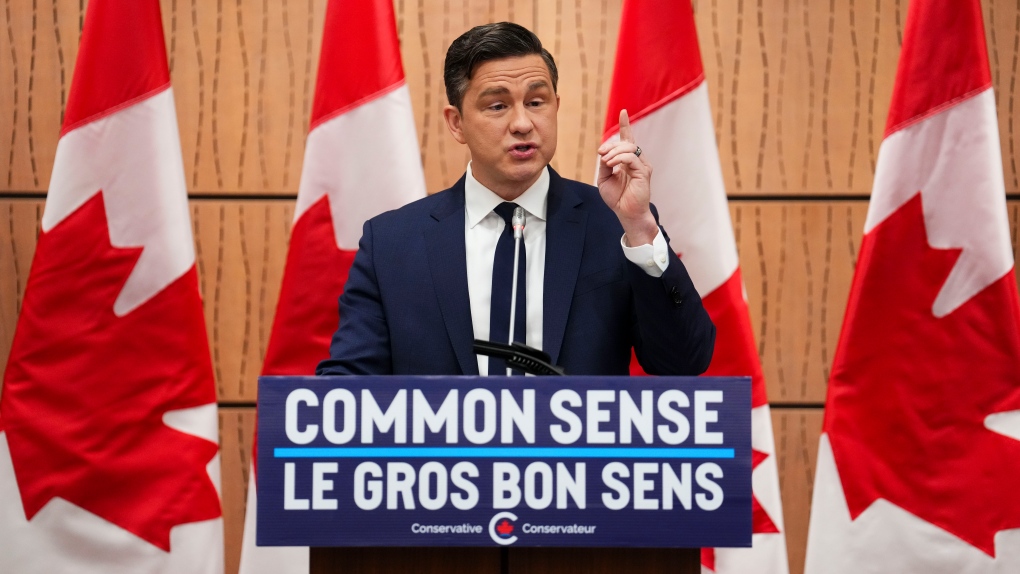Poilievre plans to move non-confidence motion in Trudeau, despite Liberal-NDP deal

Conservative Leader Pierre Poilievre is threatening to move a motion of non-confidence in the prime minister with the aim of prompting a “carbon tax election,” if Justin Trudeau doesn’t back off the April 1 price hike.
Rallying his caucus on Parliament Hill on Wednesday morning, Poilievre spoke about his party’s ongoing efforts to pressure the federal minority Liberals over their stance on pollution pricing.
“Today I’m announcing that I’m giving Trudeau one last chance to spike his hike. One last chance and only one more day,” Poilievre said.
“If Trudeau does not declare today an end to his forthcoming tax increases on food, gas and heat, that we will introduce a motion of non-confidence in the prime minister.”
All week, emboldened by the growing cross-Canada resistance to the April 1 hike from premiers both Conservative and Liberal, Poilievre’s party has been pressing the Liberals on the carbon price, including through a failed attempt to spark an emergency debate on the issue, without satisfying the criteria to prompt such a discussion.
After question period there will be a vote on Tuesday’s opposition day motion that called on “the NDP-Liberal coalition to immediately cancel this hike,” citing the “70 per cent of provinces and 70 per cent of Canadians” opposed to the 23 per cent increase to $80 from $65 per tonne of carbon emissions.
Now, with another opposition day debate and vote scheduled for Thursday, it appears the Conservatives are ready to up the ante, even if the move is not likely to succeed.
Poilievre has put a motion on notice that reads in-part: “That the House declare non-confidence in the prime minister and his costly government… and call for the House to be dissolved so Canadians can vote in a carbon tax election.”
This is not the first time the federal Conservatives have threatened an attempt to bring down the Trudeau government.
In 2020, just 20 sitting days into the last Parliament, the party looked to table a motion of non-confidence, before backing away.
It is also not the first time the party has called for a “carbon tax election.”
In November, amid a week of heavy political scrutiny over Prime Minister Justin Trudeau’s carbon-price carve-out for home heating oil, Poilievre called on Trudeau to pause the carbon tax on all home heating until Canadians go to the polls.
At the time, the Liberals welcomed the idea of fighting the next election on the marquee pollution pricing program, with Trudeau stating Canadians are “deeply concerned about the need to continue to fight climate change.”
In the months since, the government has focused its communications around the reimbursement component of the carbon tax system, rebranding the climate incentive as the Canada Carbon Rebate.
The pollution pricing program and corresponding rebate system has been in effect since 2019. It applies a levy on greenhouse gas emissions, making it more expensive to burn fossil fuels, in an effort to encourage Canadians to change their habits.
The rebates are given to Canadians through direct deposit or cheque every three months, in provinces where the federal backstop system applies.
Amid the recent calls for him to climb down from the latest increase amid persisting cost-of-living concerns, Trudeau continues to take the stance that the rebate returns more money to most Canadians than they pay in the carbon tax, while declaring his job is “not to be popular,” but to do “the right things for Canadians a generation from now.”
The parliamentary “confidence convention” as it is known, outlines an expectation that if a government is defeated on a question of confidence, it is expected to resign or seek the dissolution of Parliament in order for a general election to be held.
But, since March 2021, the Liberals and New Democrats have been operating under a supply-and-confidence agreement designed to keep Trudeau’s government in power until June 2025, in exchange for progress on NDP priorities.
The two-party deal requires the NDP to vote with the Liberals, essentially propping up their minority standing, on confidence motions such as motions of supply or money votes; motions declared by the government to be questions of confidence; and “explicitly worded motions which state that the House has, or has not, confidence in the government.”
This is a developing story, check back for updates…
View original article here Source









